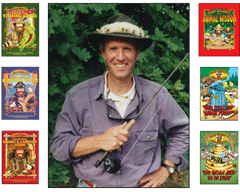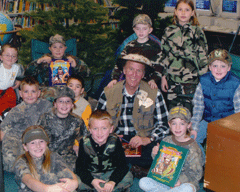Life Lessons From Wildlife
Air Date: Week of February 2, 2007

Buck Wilder and his various titles. (Courtesy of Mackinac Island Press)
Author Tim Smith talks with Living on Earth’s Bruce Gellerman about Buck Wilder, the friendly woodsman who’s the star of his series of kid’s outdoor adventure books. Smith writes about the animal kingdom to teach moral lessons and foster a love for nature in his young readers.
Transcript
CURWOOD: Buck Wilder is part Boy Scout, part Sherlock Holmes, and part Mr. Rogers. You’ll find him deep in the forest, gathered with his animal friends on the trail of some kind of mystery. And at the end of the mystery, there’s usually some sort of lesson about nature and the outdoors. Buck Wilder is the creation and sometimes the alter ego of author Tim Smith. In the last few months Tim Smith has released not one but three new Buck Wilder books for grade-schoolers. The series begins with Buck Wilder’s Adventures #1: “Who Stole the Animal Poop?” Tim Smith recently came in from the woods to talk about the book with Living on Earth’s Bruce Gellerman.
SMITH: It’s the first book in a series of out door stories. They are stories for kids that are in elementary school, the beginning years of elementary school. And they’re stories about dilemmas and problems that happen in the woods. And Buck Wilder lives in the woods and he’s very friendly and he knows all the animals. And his animal friends come to Buck to help solve the problems in the woods.
They’re stories about the outdoors and what you can learn from the outdoors and the value of the outdoors and how we’re all connected in it. I try to make the titles and the subjects fun like, “The Time the Squirrels Went Nuts” “When Time the Owls Didn’t Give a Hoot Anymore” “The Time the Salmon Stopped Running” “When the Ants Dug to China” “When the Work Bees Go on Strike.” And you know those are all the titles of the stories.

Buck Wilder and his various titles. (Courtesy of Mackinac Island Press)
SMITH: The dilemma is one of the animals comes to Buck Wilder and says, “Hey someone is in the woods and stealing all the animal poop. They’re sweeping it up. And why would somebody do such a stinky thing? Why would somebody do that?” and Buck goes, “I don’t know. Let’s go out and see if we can figure it out.” And actually the poop that’s left, and I call it that, the animal droppings in the woods are part of animal’s trails and they know, who’s been around, who’s been coming, and in the woods it’s a natural part of the woods: the decaying process, the fertilizing process and that’s kind of the environmental part of it. And so the dilemma is animals can’t find their, their tracks are being swept up also. They don’t know who’s come to visit. They’re loosing their trails. They’re loosing their scent. And Buck has to help solve that problem. That’s the dilemma in the woods.
GELLERMAN: Well, you’ve got some great characters in the book. Rascal the Raccoon, Wendell Wabbit, am I pronouncing that correct?
SMITH: That’s correct.
GELLERMAN: Sly Fox.
SMITH: Mmm Hmm
GELLERMAN: You find them in your back yard?
SMITH: I find them in my back yard. That’s right. All those characters, what I try to do is write stories that are fun about outdoors so it really gets kids and families thinking about going out and taking a look at it. The stars are always out there. It’s up to us to go out and look at ‘em. Get your imagination going, you start thinking about other things in life. Take you back to your childhood a little bit. I’ve done a lot of work for the DNR, Department of Natural Resources, in some states around the country and I may not be exact with this number but it’s staggering. I’m going to be really close. It’s been found today that the average American spends less than ten minutes a day outside. They’re not appreciating and knowing what, what’s out there and how we’re all connected to it.
And I believe truly that we can learn so much from the animals. Every single animal has an attribute or something about it that applies to our life. If you pay attention to, I don’t care what it is. You hear stories about the geese, insects or the bees, they’re fascinating. Ants alright, if you watch ants they’ll run along a trail. What they do, ants actually put a scent down called pheromone and they leave a trail for the next ant and the next ant follows that trail. When I was a kid I used to sit there and I’d wet my finger and I’d run it across that trail, just run it in the dirt. And the ant would come right to that line I drew in the dirt and he’d stop. And he can’t get beyond it because the trail’s broken. You watch them. It’s like a backup on the expressway. They all start bumping into each other. And they’ll back up, there will be a whole bunch of them. And they run back and forth and they don’t know where to go and finally they’ll find their way around. This was my way of tormenting ants when I was a kid.
But they actually talk to each other with their antennas. They pop their antennas together and they say things like, “Hey somebody just dropped a peanut butter and jelly sandwich in the parking lot. Come on let’s go!” or “Hey, there’s Chinese food over there by the dumpster! Come on!” And off they go, you know. Ants actually turn more soil, they till more soil than anything on the earth. They aerate our soil. They aerate the roots and in that turning of the soil they turn over and they plant seeds and so forth. Actually the combined weight of ants on this earth is greater than the combined weight of humans on this earth.
GELLERMAN: Buck Wilder sounds really like a lot of fun and a really happy guy. But when I hear you I hear a little sadness.
SMITH: Um, really? Well, there is some sadness in there and it’s very observant that you pick that out. My sadness in there is that um.... hunting licenses, fishing licenses, so forth, are down across the country. People aren’t going out hunting or fishing or camping or hiking like they were 20, 30, 40 years ago. The sadness if anything is that you can not sit down with a computer game in your house and give it to your kids and have them simulate an outside experience. It cannot be done. They do not feel the wind on their face. They don’t pay attention to the clouds that are going over. They don’t hear the birds. Actually, they don’t even pay attention to the trees or when the owls make a call. And we’re part of that. And, you know you go through your life, and Bruce, I don’t know how old you are or if you have children or what ever it is, but if you ever have to find some peace yourself you can walk outside. You can go down and sit by a stream. You can go for a walk in the woods. You can find the peace. What kind of peace are you going to find sitting down and playing a simulating computer game? You’re not going to go to that. You need to go to the outside for it.

Buck and some of his smallest fans. (Courtesy of Mackinac Island Press)
GELLERMAN: At the end of your book, “Who Stole the Animal Poop?” you have a decoder page in which kids can actually put together a puzzle.
SMITH: Yes.
GELLERMAN: And I’m wondering, um, I remember the decoder rings, Buck Rogers.
SMITH: Yes exactly! I remember Buck, how old are you Bruce?
GELLERMAN: Ohhh, not far behind you.
SMITH: Not far, about the same, ok because you know who Buck Rogers is.
GELLERMAN: I do indeed.
SMITH: As a boy I liked maybe it was Boy’s Life Magazine or something I can’t remember. But I used to like to flip the edge of the page and there was a little flicker animal that went PFFFF and it flies up and down the pages. And I put those in my book so I had fish going up and down and rabbits going. And it’s fun to go through a book and what I did was I put a secret decoder page at the very end of these, because there’s a lot of drawings in the book, a lot of illustrations, and I hide a letter in most of the drawings and then you have to go back and look at the book again, study it, and there’s a secret message, it’s kind of a code and you put the code together and it’s a Buck Wilder message and it’s, there’s more to a book sometimes than just reading the words. I want you to have fun with it.
GELLERMAN: Well, Tim Smith thank you very much. I appreciate it.
SMITH: My pleasure. Thank you very much Bruce.
CURWOOD: Tim Smith is the author of the Buck Wilder series of children’s books.
He spoke with Living on Earth’s Bruce Gellerman.
Links
Living on Earth wants to hear from you!
Living on Earth
62 Calef Highway, Suite 212
Lee, NH 03861
Telephone: 617-287-4121
E-mail: comments@loe.org
Newsletter [Click here]
Donate to Living on Earth!
Living on Earth is an independent media program and relies entirely on contributions from listeners and institutions supporting public service. Please donate now to preserve an independent environmental voice.
NewsletterLiving on Earth offers a weekly delivery of the show's rundown to your mailbox. Sign up for our newsletter today!
 Sailors For The Sea: Be the change you want to sea.
Sailors For The Sea: Be the change you want to sea.
 The Grantham Foundation for the Protection of the Environment: Committed to protecting and improving the health of the global environment.
The Grantham Foundation for the Protection of the Environment: Committed to protecting and improving the health of the global environment.
 Contribute to Living on Earth and receive, as our gift to you, an archival print of one of Mark Seth Lender's extraordinary wildlife photographs. Follow the link to see Mark's current collection of photographs.
Contribute to Living on Earth and receive, as our gift to you, an archival print of one of Mark Seth Lender's extraordinary wildlife photographs. Follow the link to see Mark's current collection of photographs.
 Buy a signed copy of Mark Seth Lender's book Smeagull the Seagull & support Living on Earth
Buy a signed copy of Mark Seth Lender's book Smeagull the Seagull & support Living on Earth

